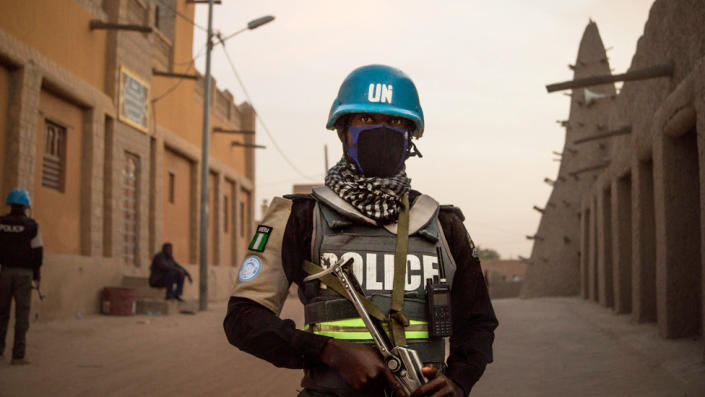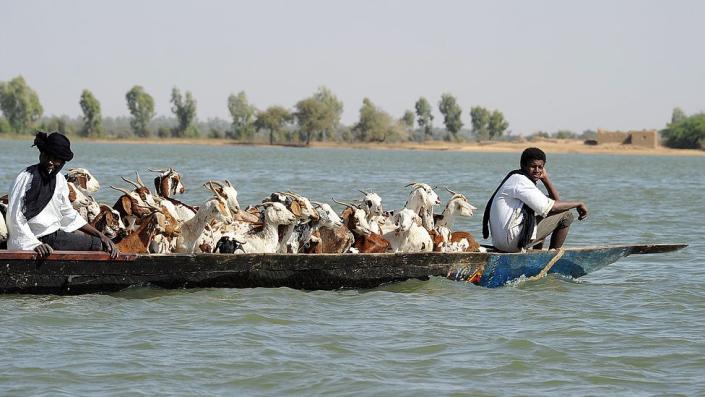
The outcome of Friday’s UN Security Council vote on the future of the peacekeeping force in Mali was never in doubt – they had no choice but to end what was the deadliest of all UN operations in the world.
During its more than 10-year deployment, some 187 peacekeepers lost their lives.
However, it is not the death toll that is driving the UN out of Mali. It is the country’s military regime that is insisting that the 12,000 international troops leave – despite a desperate security crisis that shows no signs of abating.
Once the UN peacekeepers leave, Mali will be even more dependent on the Russian mercenary group Wagner, which is believed to number 1,000 fighters in the country, for security support.
In the northern and central regions of Mali, a vast country that stretches from tropical West Africa to the Sahara Desert, armed jihadist groups launch regular attacks.
Despite Wagner’s fearsome reputation, one has to wonder about his effectiveness in fighting militants, even if the numbers are bolstered by additional fighters redeployed from the war in Ukraine.
The recent falling out between Russian President Vladimir Putin and Yevgeny Prigozhin, the leader of the mercenary group, may raise questions about the exact arrangements under which these forces are deployed.
For the Russian president, their presence is a useful way to guide France and the United States and to strengthen the Russian footprint in West Africa.

But Wagner will not have the scale of air strike power, armored units and logistical support, backed by US satellite intelligence, that was available to the French Barkhane force – which withdrew last year. last after the breach of trust between Mali and the former colonial power.
Wagner’s units seem more likely to prioritize holding a few key bases, from which they can venture out on raids and patrols, rather than an overall strategic push.
The 11 months that Mali relied on Wagner rather than French support saw jihadist groups intensify their activities and expand their reach.
Once the UN is also gone, this trend could accelerate, while the intransigent approach of the mercenaries could further alienate Tuareg and Fulani (also known as Fulani) pastoral communities.
Tensions between farming and herding communities have already fueled violence in parts of central Mali, where the fertile interior delta of the Niger River is expected to be West Africa’s rice bowl.
Amid the insecurity, more than 1,500 schools are closed and local economic life is severely disrupted. The Malian state, basic public administration and essential services are totally absent from many northern regions.
Monitoring group Acled reports that 1,576 people have been killed in 682 incidents so far this year.

Conditions are particularly bad in the northeast, where thousands of civilian villagers have now taken refuge in camps around the small desert town of Ménaka. Northern communities are most likely to suffer from the withdrawal of the UN mission.
The army claims some recent successes but is in reality struggling to cope. Even the fringes of Bamako, the capital, hundreds of kilometers to the south, have been attacked.
Mali’s military leader Colonel Assimi Goïta – who seized power in a coup in August 2020 – has demanded that the UN force, known as Minusma, take on a much more counter-terrorism role aggressive, in support of the national army.
But UN troops have had a peacekeeping mandate – to protect civilians from militant attacks, support basic public services and humanitarian aid, and back a 2015 deal. As part of that deal , ethnic Tuareg separatists in the north have agreed to remain within a united Mali – in exchange for decentralization of power to the local level.

The aggressive counter-terrorism fights were in fact the work of France’s Barkhane unit, whose departure last August was widely blamed on Mali’s decision to invite Wagner to the country.
Yet still frustrated by Minusma’s reluctance to back its heavy-handed agenda, Mali has now decided that the UN force must also pull out “without delay”, despite the UN Security Council saying that he would endeavor to do so within six months.
But there is more to this feud. Col Goïta is also upset that the UN troops do not side in support of his determination to reassert the national sovereignty of the central government and his lack of interest in properly implementing the decentralization promised under the of a 2015 peace accord with northern Tuareg rebels who fought for Azawad, an independent homeland in the Sahara.
Moreover, relations not only with the UN, but with several Western governments as well as many of Mali’s regional neighbors have been soured by mistrust and resentment over the past two years.
In September 2021, Prime Minister Choguel Maïga accused France at the UN General Assembly of abandoning the country “in the air”, even as French troops continued to die in the campaign against jihadists. Within months, the government had instead turned to Wagner.
The colleagues of the regional body, ECOWAS, already exasperated by the procrastination of Col Goïta on a timetable for the restoration of democracy, condemned the presence of mercenaries as a threat to the security of the entire region.
Then, over the next 18 months, the government imposed more and more obstacles to the operation of the UN force, such as delaying the authorization of troop rotations and limiting the flight rights of the UN force. – apparently to prevent surveillance of areas where Wagner’s men were active, and even where the lives of wounded soldiers were in danger.
Moreover, once the French combat troops left, the peacekeepers were also more vulnerable to attack.
Last July, amid a lingering dispute with ECOWAS over the transition deadline, Mali arrested 49 Ivorian soldiers who had arrived to guard UN premises under a long-standing agreement and charged them spy. All but three remained in detention until January, when they were finally released after long and drawn-out negotiations.
As the conditions for the operation of the UN force became increasingly difficult, the Ivory Coast, Germany, the United Kingdom and Sweden announced their intention to withdraw their contingents.
But the final severance of relations came with the publication in May of a UN investigation into the killing of civilians in the village of Moura, in central Mali, in March 2022.
Although the junta refused to let Minusma visit the site, the UN force managed to reach nearby communities, interview survivors and obtain proof of identity for 238 victims.
His verdict was damning: more than 500 people had been killed in Moura in March 2022 by the army and allied “foreign” fighters – a clear allusion to Wagner.
The government responded with fury, threatening to open a judicial inquiry against the members of the investigative team. He accused them of espionage, conspiracy and threatening state security.
After that, his demand for the rapid liquidation of the UN force could hardly have come as a complete surprise.

Moreover, anti-Minusma opinion had been mobilizing for months.
“It’s the whole Malian nation together rediscovering itself,” said a contributor to a recent televised debate.
The TV presenter himself described the campaign to push for the departure of the UN force – most of which is made up of African soldiers – as “a new battle against the oppressor and the West”.
Colonel Goïta has just obtained the support by referendum of a new constitution reinforcing the presidential power and authorizing the military chiefs to stand in the elections scheduled for next year. With the UN on the sidelines, he will have a freer hand to advance his agenda.
However, ordinary Malians, particularly in the fragile center and north, may miss the strength of the UN. While it proved unable to stop jihadist attacks, it provided a level of containment, ensuring a modicum of much-needed calm and stability in key towns, so that basic services, administration and protection social can work.
And his presence has at least kept alive the deal with northern groups who have lost faith in the military government.
With the departure of the UN blue helmets, certain parts of the north where the army and Wagner are struggling to make themselves felt could in fact drift even further towards de facto autonomy.
Away from the political life of the city of Bamako, the daily life of many communities is likely to become even more difficult.
Paul Melly is a consultant to the Africa Program at Chatham House in London.

